Childhood obesity is becoming a serious problem in South Africa. The UN says the number of overweight and obese children has nearly tripled worldwide in the last 20 years. In South Africa, 22% of children under five are now overweight or obese, compared to 13% in 2016.
Schools Leading the Way
The Kairos School of Inquiry in Randburg is tackling the issue head-on. Instead of fast food, pupils are served vegetarian meals such as rice and lentils with salad. Parents are also asked to pack only whole foods for their children.
Headteacher Marc Loon says the goal is not only to improve diet but also to teach children to make healthy choices. “If all schools were to be thoughtful about what children eat, the health of the nation’s children would improve,” he explains.
Fast Food Culture on the Rise
Unicef points to the growing availability of fast food as a major driver of obesity. South Africa’s fast food market was worth $2.7 billion in 2018 and is expected to reach $4.9 billion by 2026. For many families, eating fast food has become routine rather than an occasional treat.
Trainee lawyer Mamkhabela Mthembu shares her experience. As a student living above a fast food outlet, she often relied on convenience meals. Today, she struggles with weight and health issues. She now works with Unicef to raise awareness among young people.
A Wider Challenge
Experts say obesity is not only about personal choices. Gilbert Tshitaudzi from Unicef South Africa stresses the importance of environment. “How can people live healthily if their surroundings make it difficult?” he asks.
Parents also face struggles. For example, Memory Padi’s daughter Sophia gained excessive weight after medical treatment. Despite eating a normal diet, she weighs over 100kg at just eight years old.
The Way Forward
South Africa introduced a tax on sugary drinks in 2018. But campaigners say more action is needed. Restricting junk food marketing, improving access to affordable healthy food, and promoting nutrition in schools could help reverse the trend.

